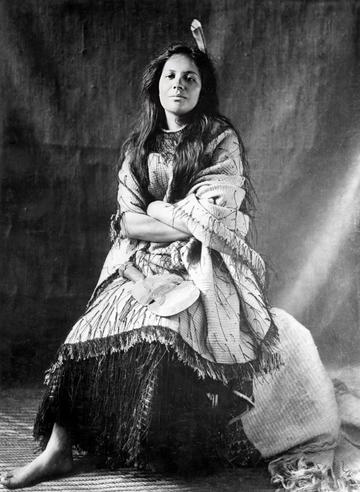Oxford ceremonies mark the award of a posthumous degree to pioneering Māori scholar, Mākereti Papakura almost 100 years after she began her studies
On Saturday, 27 September 2025 the descendants of Mākereti Papakura, the pioneering Māori scholar believed to be the first indigenous woman to study at Oxford, were presented with her degree certificate, an MPhil Anthropology almost a century after her matriculation.

Studio portrait of Mākereti c.1907 (From a private collection)
More than 100 people travelled from Aotearoa New Zealand to mark the occasion, attending events that reflected both Oxford and Māori traditions.
The University graduation ceremony took place at the Sheldonian Theatre and was presided over by Professor Irene Tracey, Vice Chancellor of the University of Oxford, who presented Mākereti’s degree certificate to her relative June Northcroft Grant. This was followed by a special ceremony at the Oxford University Museum of Natural History, the site of the inaugural Mākereti Papakura Lecture in 2022. The ceremony featured a karanga (a traditional Māori chant or call honouring the dead) welcoming their spirit and whānau (family) and a haka pōwhiri (a ritual of acknowledgement), as well as speeches and musical performances from representatives of Mākereti’s iwi (tribe), Tūhourangi.
Speaking on behalf of Mākereti’s descendants, June Northcroft Grant said;
“Mākereti Papakura has been a legend in our family for over a hundred years. We learned about her prowess as a guide, an entrepreneur, an entertainer, an astute businesswoman and an academic scholar when our parents and grandparents talked about her and their memories of her. Our family have been quietly and patiently telling her story over many decades about her thesis ‘The Old Time Māori’; knowing how important and faithful the stories from her grandparents were to the future generations. We never imagined that her work would be lauded and acknowledged. We, the Ihaia whanau of Ngati Wahiao are humbled by the recognition and conferment of this great honour from Oxford University and all those individuals who were instrumental in making this happen.”

June Northcroft Grant and Irene Tracey: Mākereti’s descendant June Northcroft Grant with Professor Irene Tracey, Vice Chancellor of the University of Oxford in the Sheldonian Theatre, Oxford after receiving Mākereti’s posthumous degree.
Professor Irene Tracey, Vice Chancellor of the University of Oxford said:
“It is wonderful that so many of Mākereti’s descendants and community have travelled so far to join us in Oxford to celebrate this remarkable woman. We are delighted to recognise her academic achievements with a posthumous MPhil Degree and to acknowledge her influence as a scholar and as an inspiration to many in the Māori community and beyond.”
Born in Aotearoa New Zealand in 1873, Mākereti is believed to be the first indigenous woman to matriculate to the University in 1927. She enrolled to read Anthropology at the Pitt Rivers Museum, where much of the teaching was conducted at the time, and at the Society of Home Students, now St Anne’s College. In her groundbreaking research for her studies at Oxford, she explored the customs of her people of Te Arawa from a female perspective. Her scholarship, combined with her indigenous worldview, earned her the respect of many Oxford academics at the time, and has gone on to be celebrated by members of Māori communities and researchers worldwide.
Tragically, Mākereti died in 1930, just weeks before she was due to present her thesis. With the agreement of her family, Mākereti’s good friend, Rhodes Scholar, and fellow Oxford anthropologist, T.K. Penniman, posthumously published her work, in a book titled The Old-Time Māori. It became the first ethnographic study published by a Māori author and is recognised as such by the New Zealand Royal Society.
The decision to award Mākereti a posthumous degree was announced earlier this year following efforts by her family, leading Māori education advocate Evie O’Brien, the School of Anthropology and Museum Ethnography, Pitt Rivers Museum and St Anne’s College, which were wholeheartedly supported by the Vice-Chancellor.
Evie O’Brien, Chief Executive of Te Wānanga o Aotearoa, former Executive Director of the Atlantic Institute, Rhodes Trust and Board Member for the Pitt Rivers Museum said:
“Mākereti paved the way for Māori women at Oxford, myself included. I had the honour of connecting more deeply with her life during my time as Executive Director at Atlantic Institute based at Rhodes Trust. It is wonderful to be back in Oxford to see her work and contribution recognised by the University with the award of a posthumous degree. While Mākereti had a deep connection with her home and people in Aotearoa she also had a special connection with Oxford, choosing to be buried in Oddington, Oxfordshire, so it is fitting that we are marking this historic occasion with events reflecting both Oxford and Māori traditions.”
Professor Clare Harris, Head of the School of Anthropology and Museum Ethnography said:
“We are delighted that the exceptional achievements of Mākereti have been recognised with the award of a posthumous MPhil degree. Mākereti was a trailblazer: not only was she the first indigenous woman to study at Oxford, but her work was also truly ground breaking. Her legacy as an inspiration to many people in Aotearoa New Zealand, the Māori community worldwide, and scholars and students internationally, continues to this day.”
Professor Ngaire Woods, Dean of the Blavatnik School of Government and former Rhodes Scholar from Aotearoa said:
“It is exceptional for Oxford to award a posthumous degree and I am particularly delighted that the University is making an award to Mākereti Papakura. Her scholarship during her Oxford studies was brilliant and path-breaking, and later published as a book “The Old-Time Maori”. It was given to me when I left New Zealand as a young Rhodes Scholar in 1987, and it was truly humbling to read it as I travelled to Oxford to take up my own studies."


